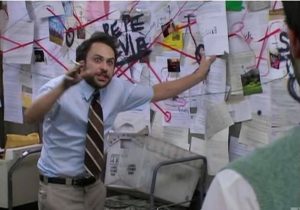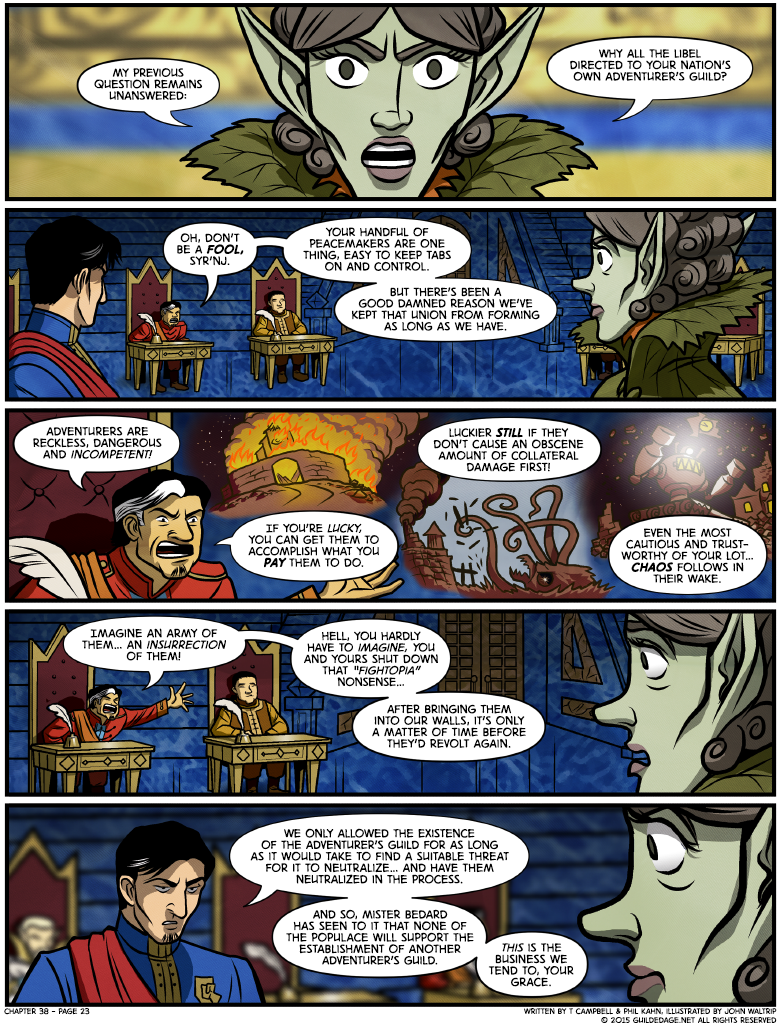Annotated 38-23
 Miyamoto maybe has half a point, here. The Fightopians did seem a bit chaotic (any group with Sundar at its head is going to be) and the Kick-Backers were kind of raw and undisciplined, too. The idea that adventurers are just a bunch of “murder hobos” is a popular one in fantasy, especially game-based fantasy, so his argument seems like a genre-savvy one.
Miyamoto maybe has half a point, here. The Fightopians did seem a bit chaotic (any group with Sundar at its head is going to be) and the Kick-Backers were kind of raw and undisciplined, too. The idea that adventurers are just a bunch of “murder hobos” is a popular one in fantasy, especially game-based fantasy, so his argument seems like a genre-savvy one.
Unfortunately, Flo and I had moved the Peacemakers away from the “murder hobo” template early on, so the examples given in the art don’t really support Miyamoto’s argument once you think about them. Neither Gralor’s attack on the docks nor the Hammertank attack on Gnometown had anything to do with adventurers’ recklessness. The Peacemakers, in fact, stopped both incidents as quickly and cleanly as anyone could reasonably expect.
 The only spot where they caused more damage than they maybe needed to was the burning church. And… (1) I don’t know, it’s not impossible that someone could’ve succeeded Scarlett directly if Frigg hadn’t sent the decisive message of setting the place on fire. And… (2) Miyamoto would have a lot more moral high ground about this incident if Jarvis hadn’t just stated that the fall of the Bloodshot Sisterhood was their plan, not just those rowdy, unmanageable adventurers doing random violence.
The only spot where they caused more damage than they maybe needed to was the burning church. And… (1) I don’t know, it’s not impossible that someone could’ve succeeded Scarlett directly if Frigg hadn’t sent the decisive message of setting the place on fire. And… (2) Miyamoto would have a lot more moral high ground about this incident if Jarvis hadn’t just stated that the fall of the Bloodshot Sisterhood was their plan, not just those rowdy, unmanageable adventurers doing random violence.
Back to Jarvis… I get that the Altruists respect Syr’Nj more for “being cold to the death of her mate,” but “We crushed your husband’s lifelong dream because it was stupid” is still a curious way to conclude a recruitment pitch.











“Adventurers are bad because chaos follows in their wake” is the same kind of logic as “fire departments are bad because buildings are always scorched when they leave”. Or “if you don’t get tested for the virus, you can’t have a positive test for the virus, therefore you don’t have the virus”.
Adventurers are sell-swords with artillery… would you like to live in a world so messed up that there are small bands of mercenaries looking for work everywhere you look?
That isn’t going to be a happy or safe place…
Adventurers are a bit like vigilantes. It’s all good an dandy when iy works. The problem comes from when it doesn’t…
Our groups have been of the better sort, but I wouldn’t go imagining there wasn’t more Bests running around, full of themselves, free to do whatever they want and run around looting old grannies sock drawers just because the interior was part of the “accessible area”.
Not to mention these are vigilantes for hire and there’s without a doubt individuals who’ll do ALL sorts of things for good pay.
Still. All those speak more towards unionizing so that adventuring activities could be bettee monitored ans responded to when they are not done “right”.
I don’t know annotationsman. I’ve seen so many stories play the “oh, those damn heroes killed HUNDREDS as collateral damage in the fight that saved the entire world, FUCK those monsters!” that I don’t even think questions Miyamoto’s dumb stretches to fault them.
Though he should’ve used their recklessness pointing at Best tossing a chain of children from an airship. lol
Oh, man, that would’ve been MUCH better. Because at least one of those kids was Miyamoto’s! His general xenophobia did always conflict a bit with what he owed the Peacemakers, and I guess I assumed he just hated nonhumans even more for being in debt to them, but it’d be much more poetic if some of his bile was a reaction to “That shit elf dangled you from WHERE?” Would’ve humanized Miyamoto, would’ve… Augh! Why didn’t we think of this? I’m so mad now!
Despite the art not reflecting the particular incident, there’s nothing keeping us from believing that it also contributed to Miyamoto’s reasoning for condemning their recklessness. His words would remain unchanged, but we get a chance to imagine even more rage in him as he attempts to camouflage how personal his vendetta is against the adventurers and keep the other houses from picking up on his sensitivities.
That’s true! Interpretation to the rescue!
I can’t believe Miyamoto himself made the case.
I had always assumed that the “Adventurers are murderhobos” biases in the Houses came from the presumably large number of Sepiaworld players offscreen being murderhobos, barely interacting with the “NPCs” beyond demanding quests and rewards and rampaging all over the place because it’s a game, and that we were seeing basically only the most RP-centric of the players… But I have to admit, there’s really no evidence in the text of that, it was just my own thinking about what it might mean for there to be a world influenced by a horde of gamers logging in and doing gamer shit.
I mean, when I’m playing Breath of the Wild, Link is pretty much just some nutjob who runs around slaughtering monsters and trading monster fangs for MOAR ARROWS. Even if he’s a perfectly normal person the rest of the time, those hours of mayhem would definitely be enough to taint his reputation.
Yeah, it does hold together better if you think of it that way.
“I mean, when I’m playing Breath of the Wild, Link is pretty much just some nutjob who runs around”
Don’t forget all the pumpkins and flower pots being smashed whenever Link visit some settlement. Their owners would be right to resent it
Especially given the exmaples that Miyamoto quotes here, it’s clear he doesn’t care about facts or little details like whether the Peacemakers started or ended some particular problem. He doesn’t like them, full-stop, and he just tells it as he thinks it.
The thing I absolutely don’t get, is: What do the heads believe telling Syr’Nj that they were playing her all along would achieve? Miyamoto probably wouldn’t mind if Syr’Nj just up and left after his little tirade, but the rest seem to be more or less on the same page. They appear to be trying to convince her of *something*, to change her opinion, but I can’t see for the life of me how her accusation of being scheming power-hungry idiots could at all be countered by anything they’ve been saying since then. There’s only a very small mention at the beginning that all this was somehow for the benefit of Gastonia, but there’s no argument (that I’ve noticed) which would support that claim.
See, I actually like the conspiracy arc, even with the illogical nature of the dialogue. It makes me think of a leadership body so immersed in their ideology that they misperceive reality (including how outsiders will interpret their actions when told). I mean these people don’t win the war…
That’s a very good point :)
I agree that many of the contradictions in these scenes can be explained by the fact that some of the Altruists actually believe that they were doing Gastonia and its population a favour, but I would also tend to think that some intuition about how others will perceive your own behaviour should be an essential skill for somebody playing this kind of game. Now, of course they can’t be geniuses in that regard either, because they not only lose the war (partially due to some out-of-universe influence if we count The Five’s abilities as that …), but they also all fall for Iwatani’s plot, which is something they should have been on guard against all the time while taking part in his plot against other fellow heads.
But then, I really can’t for the life of me not understand why anyone would dare to enter that kind of shark tank expecting to come out as the biggest shark rather than be eaten. Yet, I notice that people do that sort of thing IRL all the time, and that means I can’t really understand what drives them, and how they view the world.
“Murder hobo” is an phrase that really shouldn’t be funny, but it somehow is anyway.
“… reckless, dangerous and incompetent” so what he’s saying is, they should be heads of house?